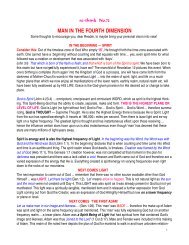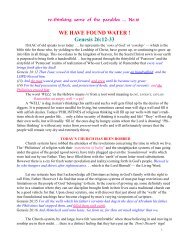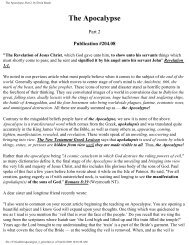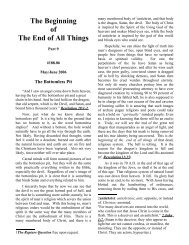Create successful ePaper yourself
Turn your PDF publications into a flip-book with our unique Google optimized e-Paper software.
LINCOLN THE UNKNOWN • 29tions to <strong>the</strong> players, and repeating Antony's oration over <strong>the</strong>dead body of Caesar: "Friends, Romans, countrymen, lend meyour ears; I come to bury Caesar, not to praise him."When he came across a passage that appealed especially tohim, he would chalk it down on a board if he had no paper.Finally he made a crude scrap-book. In this he wrote all hisfavorites, using a buzzard's quill for a pen and pokeberry juicefor ink. He carried <strong>the</strong> scrap-book with him and studied ituntil he could repeat many long poems and speeches by heart.When he went out in <strong>the</strong> field to work his book went withhim. While <strong>the</strong> horses rested at <strong>the</strong> end of <strong>the</strong> corn row hesat on <strong>the</strong> top rail of a fence and studied. At noontime, insteadof sitting down and eating with <strong>the</strong> rest of <strong>the</strong> family, he tooka corn-dodger in one hand and a book in <strong>the</strong> o<strong>the</strong>r and, hoistinghis feet higher than his head, lost himself in <strong>the</strong> lines of print.When court was in session <strong>Lincoln</strong> would often walk fifteenmiles to <strong>the</strong> river towns to hear <strong>the</strong> lawyers argue. Later, whenhe was out working in <strong>the</strong> fields with o<strong>the</strong>r men, he would nowand <strong>the</strong>n drop <strong>the</strong> grub-hoe or hay-fork, mount a fence, andrepeat <strong>the</strong> speeches he had heard <strong>the</strong> lawyers make down atRockport or Boonville. At o<strong>the</strong>r times he mimicked <strong>the</strong> shoutinghard-shell Baptist preachers who held forth in <strong>the</strong> LittlePigeon Creek church on Sundays.Abe often carried "Quinn's Jests," a joke-book, to <strong>the</strong> fields;and when he sat astride a log and read parts of it aloud, <strong>the</strong>woods resounded with <strong>the</strong> loud guffaws of his audience; but<strong>the</strong> weeds throve in <strong>the</strong> corn rows and <strong>the</strong> wheat yellowed in<strong>the</strong> fields.The farmers who were hiring <strong>Lincoln</strong> complained that he waslazy, "awful lazy." He admitted it. "My fa<strong>the</strong>r taught me towork," he said, "but he never taught me to love it."Old Tom <strong>Lincoln</strong> issued peremptory orders: all this foolishnesshad to stop. But it didn't stop; Abe kept on telling his jokesand making his speeches. One day—in <strong>the</strong> presence of o<strong>the</strong>rs—<strong>the</strong> old man struck him a blow in <strong>the</strong> face and knocked himdown. The boy wept, but he said nothing. There was alreadygrowing up between fa<strong>the</strong>r and son an estrangement that wouldlast for <strong>the</strong> rest of <strong>the</strong>ir lives. Although <strong>Lincoln</strong> looked after hisfa<strong>the</strong>r financially in his old age, yet when <strong>the</strong> old man lay on hisdeath-bed, in 1851, <strong>the</strong> son did not go to see him, "If we metnow," he said, "it is doubtful whe<strong>the</strong>r it would not be morepainful than pleasant."
















